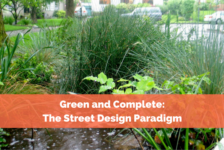I asked local whiz-bang architect and friend Andrew Mitchell this question…”Are Landscape Architects really necessary”. His answer might surprise you.
As a Graduate Architect, a crucial part of my job is analyzing other people’s designs in order to make fun of them1 and feel superior. I know it is a sacrifice that I must make for my profession, but I feel that I am the ideal person for this challenge. As a designer I am fully qualified to be anything and everything to my clients. I can design their facility from A to Z and save them money in the long run. I do not need to hire consultants, I know everything and know what is best for them. The only hiccup to my design dominance is when the client asks questions like, “Why is our warehouse surrounded by boxwoods and turf grass?” Obviously my response is, “We wanted you to feel at home when you are here. That is why we designed your site like your front yard.” Client: “Oh, I see. Shouldn’t we talk to a Landscape Architect?” Design Star: “Is a Landscape Architect necessary?”
Are Landscape Architects necessary? That is a question we face time and time again. In these tough economic times, when projects are managed on a shoestring budget, can we afford to hire another design consultant? Briefly pushing aside all the arguments regarding expertise and who went to school for what, let us examine how our brain processes information.  The human brain can only produce six bits of information simultaneously (+/- 2)2. For our example we will use four. This assumes that, at any given time one can be processing twenty-four different variations of those bits. Now let’s imagine that you are the Project Manager/Designer of a $25 million dollar medical office building. Besides managing the rest of your in-house team, coordinating consultants, adhering to a budget, managing client expectations, you are responsible for producing a functional building that doesn’t leak. I just listed five items and I didn’t even mention integration of the building into its context and development of exterior spaces. Now let’s bring expertise back into the mix.
The human brain can only produce six bits of information simultaneously (+/- 2)2. For our example we will use four. This assumes that, at any given time one can be processing twenty-four different variations of those bits. Now let’s imagine that you are the Project Manager/Designer of a $25 million dollar medical office building. Besides managing the rest of your in-house team, coordinating consultants, adhering to a budget, managing client expectations, you are responsible for producing a functional building that doesn’t leak. I just listed five items and I didn’t even mention integration of the building into its context and development of exterior spaces. Now let’s bring expertise back into the mix.
If you are a designer, one could assume that you have a four or five year undergraduate degree that equates to approximately 1,500 hours of research/design time. Couple that with two or more years of internship and possibly a graduate degree and you can add approximately 5,800 hours for a total of 7,300 hours of research/design time before you enter the job market. Unfortunately this experience only serves as the foundation for your career, most companies and clients value “real world” experience. So you work for a firm and in a year you have 2,000 hours of experience, by five you have 10,000. In his book, “Outliers: The Story of Success”, Malcolm Gladwell discusses that 10,000 hours of experience is the key to expertise. It seems that it takes the brain this long to assimilate all that it needs to know to achieve true mastery.3
Woo hoo! I just need to work for five years and I will be a master! Unfortunately, it doesn’t work that easily. Research has also shown that too much exposure too fast has negative consequences as well. In 1995 a study was performed to understand if the volume of clinical experience affected the performance of clinical clerks on surgery exit examinations.4 Students recorded their clinical experiences in a logbook during their surgical clerkship. The influence of clinical experience on examination scores and on correlations between pre-rotation and post-rotation examination performance was examined. The study determined that surgical clerks’ clinical skills were enhanced by an increased volume of some but not all clinical experiences and that feedback does not necessarily enhance performance.
So, what is all this trying to tell me?
We know that the brain has limited ability to process a multitude of functions at one time. Expertise is directly correlated to the number of hours spent practicing in a given field, but the hours spent are wasted on a sprint towards the finish and more suited for a marathon of learning. Despite the plethora of design talent I may have, if I spread myself out too thin, I only hurt the project more than help it. So, when a Client asks, “Is a Landscape Architect necessary? Can we afford to hire one?” My response will be, “Can we afford not to?”
1 Disclaimer: Stereotyping of everyone reading this article is about to occur. Although many of us want to be open-minded…sometimes it is physically impossible to be truly objective. Therefore, do not take what you are about to read as a presumption that you or the author is a narrow-minded individual, but as a optimistic proposal that you embrace a process that strives to see the big picture…Thank you
2 As presented by Scott Livingston in his presentation “Awareness: What is Emotional Intelligence and What Does it Mean for Leaders.”
3 Gladwell, Malcolm. Outliers: The Story of Success. New York: Little, Brown & Company, 2008
4 Chåtenay M, Maguire T, Skakun E, Chang G, Cook D, Warnock GL. Does volume of clinical experience affect performance of clinical clerks on surgery exit examinations? Am J Surg. 1996 Oct;172(4):366-72. PubMed PMID: 8873532
About Andrew Mitchell
Andrew Mitchell is a Graduate Architect in Fort Wayne, Indiana. (When he is not offending Landscape Architects) He spends his time enhancing community either through his firm, Morrison Kattman Menze, Inc. or his think tank, AB417. For Andy social advancement requires responsible and productive communities that address the needs and issues of an array of different, yet interconnected, individuals and groups. His aim is to cause a closer, more comprehensive examination of the costs and benefits of issues facing both individuals and communities today in order to make positive and productive changes.
(via Contour Magazine)
Published in Blog










